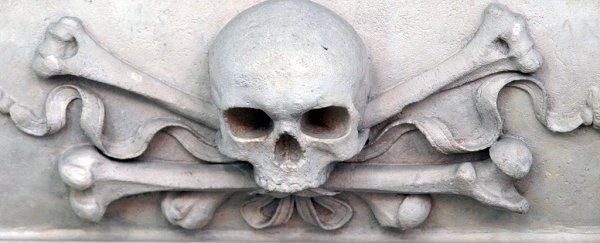Benjamin Franklin once famously wrote in a letter that "in this world, nothing can be said to be certain, except death and taxes".
This inescapable end is a scary thought for most people, but according to a recent study, those who are highly religious and those who have no religious belief at all tend to be less scared of death than the average person, which suggests that many of our behaviours are motivated by a fear of dying.
Researchers led by the University of Oxford figured this out by systematically digging through a number of previous studies to examine the ties between religiosity and anxiety over death, and to determine whether a belief in the supernatural helps or hinders people's acceptance of their own eventual demise.
Their work revolved around a concept known as Terror Management Theory (TMT), which hypothesises that the conflict between our desire to live and the knowledge of inevitable death is a key driver behind many cultural values and rituals.
This awareness - or 'mortality salience' - creates behaviours that help us either avoid death or distract ourselves from it, including the speculations we make in defence of our world views.
It's this defence mechanism that is thought to inform our desire to mix with a particular social group, influence our political and religious convictions, and affect how we engage in various social rituals such as attending church or political rallies.
This hypothesis predicts anxiety over death will be lowest among the extremely religious, since fear of death would naturally drive people into religious cultures where their stress would be mitigated.
The team used data from 100 studies conducted between 1961 and 2014 to correlate the degree of religious conviction and anxiety over death in 26,000 people worldwide.
When all of the studies' effects were analysed together, the researchers found that having strong faith had a weak but significant link with a lower fear of death.
No matter which specific beliefs or behaviours they looked at – whether it was just a fervent belief in the afterlife or regular church attendance – as the effect gained strength, anxiety over death seemed to fade.
The research provided a few other interesting details – many of the studies explored the difference between intrinsic religiosity (faith driven by a view of religion as an ends to itself), and extrinsic religiosity (faith influenced by a value in social cohesion or personal comfort).
The meta-analysis found that those who defended their faith as "intrinsically important" tended to have less anxiety over dying, while those with higher degrees of extrinsic motivation tended to also have a higher degree of anxiety over death.
According to the TMT world view defence hypothesis, most atheists would worry less about dying – after all, if they did feel anxious, the hypothesis predicts they'd seek out some way to alleviate it, such as religion.
The team looked at the results of individual reports and found that of the 11 that included data from atheists, 10 backed up the view that most of them weren't all that anxious about death.
What does all of this mean? Given correlations such as these don't describe a clear cause, we're left to speculate.
"This definitely complicates the old view, that religious people are less afraid of death than nonreligious people. It may well be that atheism also provides comfort from death, or that people who are just not afraid of death aren't compelled to seek religion," said researcher Jonathon Jong from the University of Oxford in the UK.
Could those who are anxious about death seek out religion, as TMT asserts, or could weak religious belief create anxiety itself?
It's clearly complicated, especially given the range of conflicting results among the reports found by the researchers, which suggests possible differences in time or across cultures.
Hopefully, we all have a few more years to worry about the answer…
This research was published in Religion, Brain & Behaviour.
